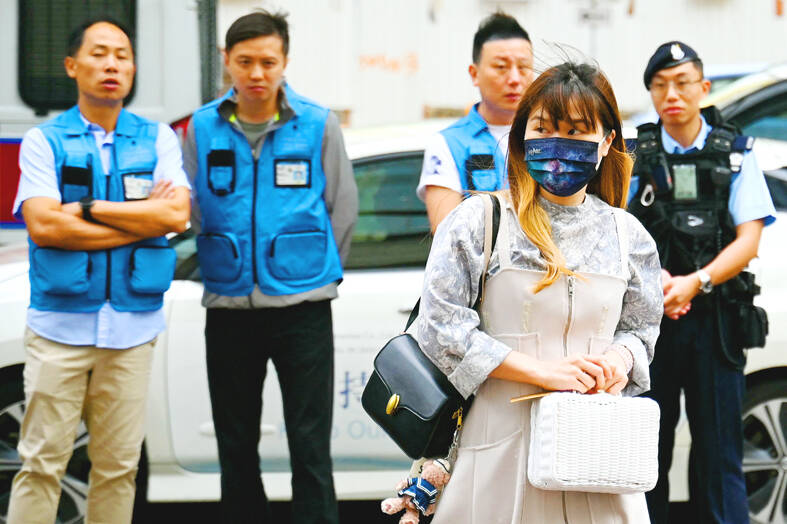The final arguments in Hong Kong’s largest national security trial began yesterday, more than 1,000 days after authorities filed charges against 47 democracy advocates under a law imposed by China to quell dissent.
The defendants represent a cross-section of Hong Kong’s opposition — from democratically elected lawmakers to unionists and academics — which has been effectively squashed after Hong Kong’s National Security Law was imposed by Beijing in 2020.
The 47 defendants were charged with “conspiracy to subvert state power” and face up to life in prison in a case widely considered a bellwether for Hong Kong’s political environment.

Photo: AFP
They were accused of organizing, joining and supporting an unofficial primary election in July 2020 to coordinate candidates for the territory’s legislature.
Judge Andrew Chan (陳慶偉) said that the verdict would be delivered “tentatively three, four months” after the final round of legal arguments, which is expected to last 10 days.
Protesting outside the court, Alexandra Wong (王鳳瑤), a well-known activist nicknamed “Grandma Wong,” waved the Union Jack and held a sign reading: “Free 47, Free all.”
“I hope they can be released immediately. The 47 only wanted to fight for genuine universal suffrage for us,” Wong said. There were “no other motives, not to take the power.”
Prosecutors said the defendants planned to seize a legislative majority to force Hong Kong authorities to meet the “five demands” raised by protesters in 2019.
The demands included launching an independent inquiry into alleged police brutality against protesters and gaining universal suffrage in elections for the territory’s chief executive and lawmakers.
Prosecutors also say the defendants intended to veto the government’s budgets with the aim of forcing the chief executive to step down.
Lead prosecutor Jonathan Man (萬德豪) yesterday argued that the defendants should be convicted even if no violence was involved, as it had become easier for people to manipulate public communication channels to subvert state power.
“We are talking about a conspiracy to have legislators vetoing the budget indiscriminately,” Man said.
The national security legislation was “meant to be a strong law” and should not be narrowly interpreted, he added.
Randy Shek (石書銘), one of the defense lawyers, responded that the defendants were seeking democratic elections for Hong Kong’s leader and lawmakers in line with the territory’s constitutional text, not trying to topple the government.
“What they did was simply seeking to hold power to account, that cannot be subversive,” Shek told the court.
“They relied on a constitutional mechanism to bring about policy changes, that cannot be subversive,” he said.

The US government has signed defense cooperation agreements with Japan and the Philippines to boost the deterrence capabilities of countries in the first island chain, a report by the National Security Bureau (NSB) showed. The main countries on the first island chain include the two nations and Taiwan. The bureau is to present the report at a meeting of the legislature’s Foreign Affairs and National Defense Committee tomorrow. The US military has deployed Typhon missile systems to Japan’s Yamaguchi Prefecture and Zambales province in the Philippines during their joint military exercises. It has also installed NMESIS anti-ship systems in Japan’s Okinawa

‘WIN-WIN’: The Philippines, and central and eastern European countries are important potential drone cooperation partners, Minister of Foreign Affairs Lin Chia-lung said Minister of Foreign Affairs Lin Chia-lung (林佳龍) in an interview published yesterday confirmed that there are joint ventures between Taiwan and Poland in the drone industry. Lin made the remark in an exclusive interview with the Chinese-language Liberty Times (the Taipei Times’ sister paper). The government-backed Taiwan Excellence Drone International Business Opportunities Alliance and the Polish Chamber of Unmanned Systems on Wednesday last week signed a memorandum of understanding in Poland to develop a “non-China” supply chain for drones and work together on key technologies. Asked if Taiwan prioritized Poland among central and eastern European countries in drone collaboration, Lin

The Chien Feng IV (勁蜂, Mighty Hornet) loitering munition is on track to enter flight tests next month in connection with potential adoption by Taiwanese and US armed forces, a government source said yesterday. The kamikaze drone, which boasts a range of 1,000km, debuted at the Taipei Aerospace and Defense Technology Exhibition in September, the official said on condition of anonymity. The Chungshan Institute of Science and Technology and US-based Kratos Defense jointly developed the platform by leveraging the engine and airframe of the latter’s MQM-178 Firejet target drone, they said. The uncrewed aerial vehicle is designed to utilize an artificial intelligence computer

Renewed border fighting between Thailand and Cambodia showed no signs of abating yesterday, leaving hundreds of thousands of displaced people in both countries living in strained conditions as more flooded into temporary shelters. Reporters on the Thai side of the border heard sounds of outgoing, indirect fire yesterday. About 400,000 people have been evacuated from affected areas in Thailand and about 700 schools closed while fighting was ongoing in four border provinces, said Thai Rear Admiral Surasant Kongsiri, a spokesman for the military. Cambodia evacuated more than 127,000 villagers and closed hundreds of schools, the Thai Ministry of Defense said. Thailand’s military announced that